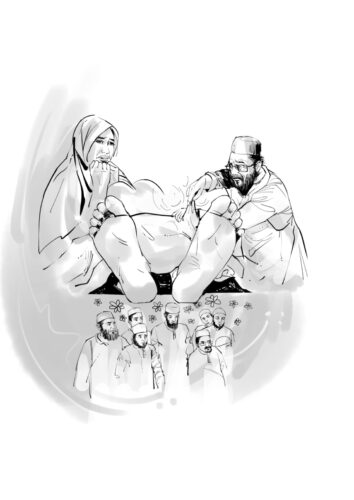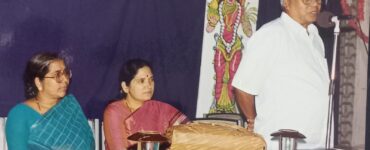Original (Telugu): K. Anandachari
Chand said to his daughter, “Beta, don’t do that. Go inside.” Saleema, however, did not heed his words and continued to poke at the small sparrow that was busy building a nest in the eaves. Larger sparrows were bringing pieces of straw and leaving them on the disrupted nest, while the smaller one was arranging them in an order. Saleema was observing the small sparrow and thrusting her finger at it in a playful manner. Her father told her to stop scaring the sparrow, but children study such things keenly. Saleema was no exception.
It was the eaves of the veranda at the back of the three-room portion. Saleema was the youngest daughter of Chand. The house was built long ago with red mud, and its walls were plastered with lime. Bits of plastering had come off here and there. The red mud became wet and turned red. Whenever the indwellers of the house saw those walls, old memories came to their minds. Abutting that part of the house, there was another three-room portion with a tiled roof. Some distant relatives of Chand resided in it. There was a tall compound wall too, around that house, and an empty space in the front. A large main door existed in the compound wall. Two vertical wooden tilts stood on either side of it, with a thin rope tied to across them. A big curtain, made by stitching empty gunny bags, hung from the rope. There were curtains on the windows and other doors of the house. Their colour cannot be ascertained as they were very shabby. Chickens keep moving in front of the compound wall.
Illandu is not a much developed town. Yet, it has historic prominence. Ruins dating back to Nizam’s regime are still seen here and there. There are just two main streets in the town. If one walks in the street on the East, turns right at the terminus, traverses some distance and turns right again, Chand’s hose appears on the South. Chand had four daughters and a single son. He had married off two of his daughters with much difficulty. They live in the same town.
In the Aam bazaar of the town, there is a bicycle shop, which is known by its owner Samad. Chand repaired bicycles and mended punctures of tubes and tyres in a corner of the shop. He could somehow make both ends meet with the meagre income thus earned. He taught the same work to his son, who, despite his father’s constant encouragement, could not shine in his school studies. He reached the tenth standard with much difficulty, failed in it and started coming to Chand’s shop. Since he was the only son in the family and was born after two girls, his parents brought him up with fondness.
“Chand, Chand,” some people were calling from outside. Javed, Chand’s son said to his father, “Abba, somebody is calling you.” “I am coming. Who is it?” said Chand, and came out of the house.
“Chand bhai, the old man, Gaffoor saab in the second ward has passed away. They want your services there,” they said. Excited, Chand put on a taqiyah on his head, wore chappals and moved, saying, “I am coming.”
When any Muslim dies in the town, Chand does the work of cleaning up the corpse by washing it to prepare it for Janane ki namaz. He had been doing it for the past twenty-five years. Without it, how could he feed such a big family just by doing bicycle repairs and mending punctures!? He gets this work once or twice a month. If he washes one dead body and prepares for the religious rite he would get between five hundred and three thousand rupees, depending upon the financial status of the dead man’s family.
Time passed in this manner. Now that the sales of bicycles had reduced, Samad has closed his shop. Yes, bikes abound on roads now. However poor they may be, people want to buy a Hero Honda bike! Banks are giving loans easily. The only source of Chand’s income is gone now. Therefore, he made his son work in a bicycle shop. The family is living on the son’s meagre earnings. Making both ends meet became very difficult. Chand’s wife stitches blouses and petticoats on a sewing machine at home. However, as she cannot stitch modern designs, her work looks obsolete. Even the stitching she does occasionally. Her earnings are coming handy to buy dresses for the daughters.
Chand’s age is over sixty now. Added to it, he is suffering from regular illness and getting chest pain. He consulted a local RMP doctor, who diagnosed him with a heart disease, and advised him to go to the district headquarters. He was taken to the medical college hospital at Khammam, without much delay. The doctors there said that a stent had to be placed in his heart. Chand incurred a moderate expenditure for the same. He was discharged and brought home with the help of his friends. He took rest for two to three months. Running the home became very difficult. Bicycle shops are disappearing. His son Javed, too, is not doing any work now. Chand told Javed to learn the repair work of bikes, but the boy wouldn’t heed his words. Chand didn’t pressure him much. So, Javed has become a paperboy. However, a bicycle is needed for the same. They are trying to buy one.
A few more months passed this way. Chand has recovered a bit. But how to run the home without doing any work? He pondered about it every day. At last, he met his friends to find to seek advice. He told them his health was good. “Inform me if anyone dies; I can do the work of corpse washing,” he added. All his friends were good, and they too, were trying to come out of troubles. Now and then, they were helping him financially with small amounts. But how long can they help him his like that! Chand’s children, too, lived as per their father’s wish, which was his fortune. Now, the rate of deaths has reduced drastically. Deaths occur roughly once a month.
* * *
Chand’s wife said to her husband in a low tone, so that their children don’t hear it: “Rice has exhausted in our home.” “Wait a bit. I am thinking about it,” said Chand, with his palm on his chin. Sitting on the pial in front of his house, he was reflecting on it. He sauntered to and fro in the front yard. Then, he peeped into the house and said to his wife in a hushed tone, “Check if some grains are there.” She understood that he intended to borrow rice from their neighbours. ‘How can I take rice on loan?’ she questioned herself. It was one pm in the afternoon. As a stent was placed in Chand’s heart recently, his wife and children have been refraining from saying words that would pain him. However, wouldn’t agony pile up in his heart in such circumstances? He didn’t know what to do. Chand was a man of self-esteem. How many times could he ask his friends for loan? His heart didn’t agree to it. Facing poverty is a difficult thing for middle-class people. Life’s travails create thorns for them, and they self-immolate by falling on them. So, nothing could be done.
He felt relieved when he heard two people calling out to him, “Chand bhai, come here at once.” For him, it was a hope-giving call from God, and he cheered within himself. He moved out and asked, “Who is that, bhai?” One of them said, “The father of Saleem saab in the thirteenth ward has passed away. They want you there.”
“When did it happen?”
“Three to four hour hours ago. Children, relatives and others have arrived”
“I am leaving soon,” Chand said. He rushed inside the home, took his taqiyah, put on chappals and said to his wife, “I will come back by 4:00 pm. I will buy rice on my way back. Have little patience.” He moved out enthusiastically.
Chand’s wife untied the knot of a kerchief in which she had stowed away some money. She counted the coins in it. They were fifteen rupees. She called Saleema, who was sitting listlessly, gave her ten rupees and said, “Beti, take this money and bring two packets of biscuits from the shop nearby.”
Saleema requested her sister, “Aaapaa, please bring some water for me.” She drank the water brought by her sister, rushed to the shop, brought the biscuit packets and gave one to her brother, Javed. The two sisters shared the other packet. Javed gave some biscuits to his mother, saying, “Have these, ammee.” However, she was absentminded. She was thinking when Chand would come and the children’s hunger would be fully satiated.
Chand arrived at 4:30 pm with a bag of rice in his hands. Saleema took it from her father and ran inside. Chand went to the back yard from the side of the house, removed his clothes, took a bath and came into the home. Exhausted, he fell on a cot. Saleema gave a few biscuits to his father, saying, “Abba, we had biscuits. You, too, have some.” She did that because rice meal was not ready yet. Chand thought Saleema had acted like a mother. His heart became heavy. When Chand recognised that the children had some relief from hunger by eating the biscuits, he called his twelve-year-old daughter, Saleema, and kissed her hand. Meanwhile, Chand’s wife yelled from inside,”Ajee, meals are ready. Come.” Saleema’s sister, Zubeda arranged plates for everyone. They all sat together, and each of them had a hearty meal comprising hot rice, khatta and egg curry.
Chand lay in a cot to get relief from his post-lunch uneasiness. His wife sat beside the cot and started stitching hooks for her customers’ blouses. She asked him how the old man had died.
Chand explained: “He was already very old. He talked with everyone in the morning, they say. He called all his people near him at 11 am. He breathed his last, placing his hand in the hands of his children. They say it’s a heart attack.” ‘He is a great man, because he filled our tummies by ending his life today. How weird is this world! Had he not died today, how would our hunger have subsided? God does many kinds of inscrutable things,’ he thought, and became philosophical. He recalled the old man and saluted him. Yes, how strange it is! One’s death has given life to others. Really, it is very strange.
Among Chand’s children, Saleema was the most attached and friendly with her father, while his son and the other daughter would stay more with their mother. Chand, too, often talked with Saleema to forget his worries. Saleema would tell her father various things. He listened to all of them and gave replies carefully. He even shares matters of elders with her. She behaved like his mother, and asked him everything. She even suggested solutions to some problems. In between, she made him laugh. She talked with her father in the manner as elders would.
That day too, Chand was talking with Saleema. He said, “Beti, go on talking.”
“Abba jaan, you keep saying haan. Have you fallen asleep?”
“No, I haven’t, my child.”
“I will tell you a story. Listen it.”
Uttering haan, haan, Chand placed his hand on his chest due to discomfort, suddenly raised his head and looked at Saleema. Then, he pressed the hand on the chest. Saying, abba, abba, kya hua?, Saleema took her father’s head in her hands. “Beti …” his eyes were closed. His wife and son rushed from inside saying, “Kya hua?” Chand breathed his last in the hands of his daughter.
Saleema fell on her father’s chest and screamed, “Abba, abba.” A neighbour came, held his forearm near wrist and said, “His pulse has stopped.” Zubeda collapsed, and Javed slumped at Chand’s feet.
The news was conveyed to Chand’s friends. While the wife, son and the other daughters were weeping, Saleema refrained herself from doing so, and sighed heavily. She remembered her father’s words said by him long ago: “If one teardrop falls down, I will have to bear the weight of a mountain.” She didn’t want to increase her father’s burden. So, she told her mother, sister and brother not to weep.
Chand’s friends had arrived and inquired how the demise had occurred. Time was passing. The moment of Chand’s journey into the earth was nearing.
There was not a single paisa in the house. They need at least seven to eight thousand rupees for the funeral rites. Chand’s friends, too, were poor. Yet, they donated small amounts. Sons-in-law were poor, as well. They also contributed some money. A very old man who was sitting on the pial hurried them up, saying, “What are you all looking at? Why don’t you call a gassaal?”
“Where is the gassaal? He was a gassaal himself,” said someone. Another person said, “There is one more in the ward number thirteen. Call him.” “But, these people have to spend one to two thousand rupees,” remarked another. Meanwhile, a neighbour brought the news that the said corpse washer was out of bounds. Some elderly people pondered, ‘Death is an equally big celebration, bhai. It has to be considered a sacred thing. How many corpses did this man clean and render them ready them for burial! But there is none to do so for his body today. What a fate is this?’
While the problem was being discussed, Saleema rushed to them and said with firmness, “Don’t worry. I will do it for my father.” The elders were surprised, and they intervened, questioning, “How can you do it when you are a child? You should not do it. Moreover, what do you know about it?”
Another man remarked, “Being a girl, how can you perform the funeral rites?” Saleema replied, “It is true that I am a girl. But I am an heiress to my father’s body. His heart that had been beating for our sake has now stopped. The body that worked hard for our welfare has exhausted and become lifeless. When can we ever repay his toil? What if I am a girl? Aren’t we seeing women lighting the funeral pyres of their parents? Why this hassle of male and female for funeral rites? Do we have to go through the torment of not having a gassaal despite our presence? Do birds observe this difference between male and female? Are such divisions needed in expressing love for one’s father? Please don’t obstruct my affection for my father on the pretext that I am a girl. Abba explained to me all the methods of the funeral rites. And he explained only to me. Inheritance doesn’t just mean sharing the assets. Following what was told by him is equal to inheritance, too. Isn’t it my responsibility to send him off with love and freedom in a proper manner? I know everything. I can do it. It would only be fair if I do it to him. He taught me the method. What to do, how to do … I know everything.”
A fourteen-metre-long white cloth is needed. Two three-metre-long pieces of cloth have to be prepared. One of them should be placed on the body. Gloves should be fitted to fingers and toes. A half-metre kerchief has to be made. The other three-metre cloth should be cut into three pieces, and two from them should be placed on the mat. A shirt has to be made with the other one. The body should be cordoned off with a curtain around. It has to be placed on a table. After undressing the body, a piece of brick should be wrapped in cotton and perineum has to be cleaned with it. Then, it should be washed with ten pitchers of water and cleaned with some shampoo. Then, the whole body should be bathed with fifteen pitchers of water in which, leaves of wild jujube are placed. Camphor has to be applied all over the body. Wax should be removed from the ears, and nails have to be cut. Surma should be applied to the eyes. Attar has to be sprinkled on the body. Knots should be made at feet, waist and head with cloth and tied. Then, the body has to be put in the coffin, ensuring the head is towards the front side of the house. Then, under the guidance of a moulvi saheb, all are made to pray Allah to grant the fortune of heaven to the deceased. Then, the body is taken to a masjid for namaz by all. From there, the last journey to the burial ground takes place.
All these instructions explained by her father, were ringing in Saleema’s ears. Once, when Chand had returned from corpse washing, she asked him about the method. Then he had explained her all these things in detail. Saleema was resolute in her mind that she should never forgo the opportunity of doing the last rites for him.
‘Abba’s hands had washed and cleaned hundreds of dead bodies in the past twenty-five years, sprucing them up for the last journey. They washed many an impurity of the bodies and daubed scent on them. It is my responsibility to clean my abba’s hands. It’s my fortune as well. Nobody should prevent me from doing it.’
“No, you are a girl. So, you shouldn’t do it,” an elderly man said, trying to convince her. Then, Saleema came to a conclusion. She called her brother Javed, and said, “Bhai, do as I instruct you.”
She swallowed her tears while giving water for bathing the corpse. The scent of her love was smeared all over her father’s body. Like a mother, she got her father’s body washed and cleaned. Ultimately, Chand’s body was transformed into a white mountain of snow.
It was a calm scene. Nobody talked. Everything was going on in the right way. The terminal journey has started. A flock of white pigeons moved like a serene river. A life’s hardship had ended. A fragrance of attar took a bend and progressed.
(This story won the first prize in the competition organised jointly by Mulkanuru Public Library and Namsthe Telangana in 2020.)
***
Notes:
Beta/Beti: son/daughter
Aam bazaar: mango market
Bhai: brother
Saab: a term used for denoting reverence
Taqiyah: skullcap
Chappal: a kind of footwear
Janane ki namaz: Muslims’ prayer for peace of the departed soul
Pial: a raised platform, usually of stone (originally a Tamil word)
Aapa: elder sister
Ammee/Ammaa jaan: endearing term for calling a mother
Abba/Abba jaan: endearing term for calling a father
Ajee: O (used for addressing an elder person)
Khatta: seasoned tamarind juice
Haan: a word to say yes
Gassaal: a Muslim man who washes the body of a dead person
Surma: collyrium
Moulvi Saheb: a Muslim priest
Attar: perfume









Add comment